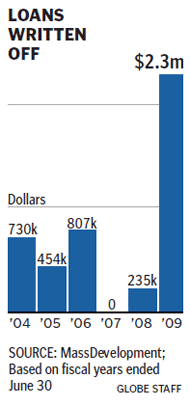The Massachusetts Development Finance Agency — a quasi-public agency that lends money, makes grants, and develops government property to stimulate new investment — has seen a surge in troubled loans because of the weak economy.
MassDevelopment was forced to write off $2.3 million in loan losses in fiscal year 2009, the largest amount in seven years. And more than a half-dozen of its other loans are seriously delinquent. Taxpayers provide some, but not all, of the loan money.
Community development lenders “have been hit pretty hard over the past 18 months,’’ said Toby Rittner, president of the Council of Development Finance Agencies, an industry group based in Cleveland. The troubled loans reflect the difficulties faced by many lenders in the wake of the crumbling housing market and high unemployment.
Yet despite the increase in troubled loans, MassDevelopment officials said the losses so far have been less than feared, given the intensity of the economic downturn and the size of the agency’s $114 million loan portfolio. Moreover, MassDevelopment said it hasn’t been forced to cut back on new loans, which total about $40 million a year.
Like other local lenders, MassDevelopment has probably benefited from the fact that the state’s housing market and employment have been stronger than in some other parts of the country, such as California and Nevada.
“We are watchful, but not worried,’’ said Laura Canter, a MassDevelopment executive vice president.
The losses are hard to predict. Consider the case of Lawrence’s aging industrial district.
More than four years ago, Massachusetts economic development officials struck a deal to help brighten the area, lending $1.8 million to a partnership to convert two old mill buildings into a center to host foreign manufacturing companies.
Lawrence officials had strongly supported the 80,000-square-foot project, hosting a dinner for Irish and Canadian companies to tour the facility, dubbed the South Canal International Business Center. The partnership had lined up more than a dozen tenants, including a trade association representing Canadian wood products companies and Campbell Glass, a firm that specializes in replacing large stained-glass windows in churches in Northern Ireland.
But soon after opening in 2007, the South Canal Street project hit trouble, including the loss of tenants, infighting among partners, and late payments on the loan. After the partnership stopped paying the loan, MassDevelopment foreclosed and auctioned the property off in November.
But even after the sale, MassDevelopment told board members it was still owed $1.5 million and there was “no remaining collateral to liquidate.’’
Community development specialists say it’s difficult to measure whether MassDevelopment’s losses are greater, or less, than those of other community development agencies around the country.
Such programs vary in their missions and scope of lending, making comparisons difficult. But the groups tend to have higher losses than banks because they are charged with trying to support economic development projects that are considered too risky for conventional lenders.
Last fiscal year, MassDevelopment said it wrote off 1.5 percent of its loans, about double the average for small- and mid-size banks in Massachusetts.
“MassDevelopment’s charge-offs will tend to be higher than those of private banks given the higher-risk nature of its lending programs,’’ the agency said.
And Chaston Associations Inc., a North Andover firm hired to review its portfolio, recently found 44 percent of MassDevelopment’s loans were in the highest risk categories, compared to just 23 percent for banks.
“The agency has a much higher risk tolerance and lends under different conditions than the average bank is allowed or able to undertake,’’ Chaston wrote. Chaston couldn’t be reached for comment.
Some high-risk loans, though, are never repaid. Last year, for instance, MassDevelopment charged off portions of loans to two small drug makers: $1.5 million to Spherics Inc., a biotech firm that relocated from Rhode Island to Mansfield with aid from the state, but wound up shutting down in 2008, and $568,458 to Acusphere Inc. in Tewksbury, a specialty pharmaceutical firm that downsized after struggling to win regulatory approval for its primary product. Another failed loan had been used to finance environmental cleanup on the Amesbury waterfront.
Still, MassDevelopment says taxpayers won’t necessarily bear the brunt of the losses. In addition to funding from the Legislature, MassDevelopment also funds loans with interest it earns on successful loans and with fees for issuing tax-exempt bonds for nonprofits, manufacturers, and certain other projects.
Some of MassDevelopment’s most troubled loans, including the one in Lawrence, came from a separate $30 million fund, called the New Markets CDE #1, funded with a mix of the agency’s own money, federal tax credits, and funds from two regional lenders: Sovereign Bank and Citizens Bank.
MassDevelopment said 13 percent of the loans in the fund are more than 90 days overdue.
In the Lawrence project, MassDevelopment approved $1.8 million in loans in late 2005 and early 2006 to a partnership called 29 South Canal LLC.
But by late 2007, MassDevelopment had downgraded the loans due to late payments and litigation among some parties. According to court documents, one tenant complained about lack of heat and air conditioning, debris from construction, and other problems with the buildings.
MassDevelopment said it was forced to auction the building late last year for $700,000.
It has sued the partnership and individuals who co-signed the loan to collect the $1.5 million it is still owed, but said it is too early to know how much it will ultimately lose.
Despite the troubles, MassDevelopment spokeswoman Janet Hookailo said the loan to the Lawrence venture achieved an important goal.
“At the end of the day,’’ Hookailo said, “a building that was a derelict eyesore has been renovated, occupied, and is contributing to the local economy.’’
Todd Wallack Boston Globe May 10, 2010

No comments:
Post a Comment